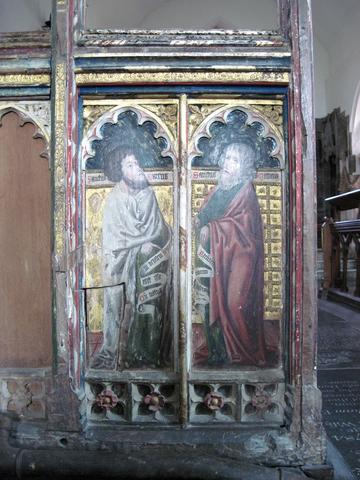Paint and Culture in Medieval England

St Mark and St Matthew on the 16th-century screen at Bramfield, Suffolk.
© Lucy Wrapson, Hamilton Kerr Institute, University of Cambridge
Supervisory team: Professor Gervase Rosser (Professor of the History of Art, University of Oxford) and Dr Lucy Wrapson (Hamilton Kerr Institute, Fitzwilliam Museum)
Open-Oxford-Cambridge AHRC DTP-funded Collaborative Doctoral Award at the University of Oxford in partnership with the Hamilton Kerr Institute, Fitzwilliam Museum, Cambridge.
Paintings conservators take microscopic paint samples during conservation treatments, usually with the primary aim of making treatment decisions. These samples, commonly in the form of cross-sections of paint, are typically retained but cease to be utilised after the intervention, and currently have little impact on the conservation or wider academic communities or on the public. The Hamilton Kerr Institute (HKI), a department of the Fitzwilliam Museum (Cambridge), preserves about 1000 samples from paintings of the medieval period, in which it has a well-established specialism. The HKI also houses the archives, including paint-samples, of important figures in the first generation of professional conservators. This project will transform the use of this material, giving a DPhil student the opportunity to study English medieval art in its wider European context across a range of painted surfaces, and to conduct the first ever scientifically-based survey of medieval painting technology, taking full account of regional and chronological variations.
Medieval painters worked on panel and wall, on cloth and in manuscripts. Disciplinary divisions have created false distinctions in our understanding of these techniques. The new research will make it possible, for the first time, to provide an overview and broad characterisation of the materials and techniques of late-medieval English painting. Themes to be investigated will include the organisation of artists’ workshops, the dissemination of particular craft practices over time and distance, and the relationship between diverse media. Crucially this can be accomplished without additional invasive sampling. The use of samples originally taken for other purposes will provide its own challenges and insights, raising important research questions concerning the requirements of conservation documentation and developing protocols for the profession to maximise the benefits of invasive sampling in the future.
It is an ambition of the HKI to develop research into its archival holdings, to explore new ways of using these resources, and to widen the academic reach of its heritage science resources. Technical study of the kind pioneered at the HKI is a comparatively new discipline which provides ways of understanding cultural heritage that cannot be gleaned solely from looking at an object. However, as John Ruskin wrote in 1848 when reviewing Eastlake’s Materials for a History of Oil-Painting, we need to understand the techniques which contribute to the making of works of art – but we also need to think about why this matters. Technical understanding is indispensable; but it is lifeless without perception of its implications for the life and culture of humanity.
Oxford University’s Art History Department and wider Humanities Division offer uniquely rich resources for the study of medieval painting in its cultural context, including current specialist research not only in medieval wall paintings, manuscripts and sculpture, but also in medieval languages, literature, and music. This project, by transforming the interpretation of the HKI’s combined archives, will ground significant questions in cultural history in scientifically analysed technical evidence.
The HKI is an unmatched research and training environment with links to the museum sector through the Fitzwilliam Museum and to the heritage sector through its commercial conservation work. The HKI trains conservators to postgraduate diploma level and hosts postgraduate interns and PhD students. The successful candidate will become part of a dynamic group of researchers in the Department of Art History at Oxford University and will also be part of the HKI’s community of postgraduates. The CDA offers the chance to develop a unique set of transferable skills working with experts at both Oxford and the HKI, which can provide access to dedicated professional development and training. As well as working with Prof. Gervase Rosser and Dr Lucy Wrapson, additional supervisory support will be provided by Dr Spike Bucklow at the HKI.


